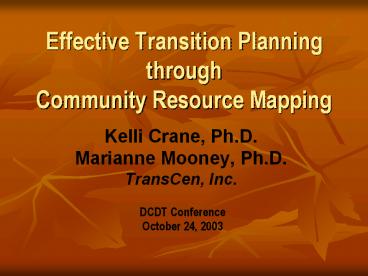Effective%20Transition%20Planning%20through%20Community%20Resource%20Mapping - PowerPoint PPT Presentation
Title:
Effective%20Transition%20Planning%20through%20Community%20Resource%20Mapping
Description:
Kelli Crane, Ph.D. Marianne Mooney, Ph.D. TransCen, Inc. DCDT Conference ... presented by Kelli Crane, Ph.D., and Marianne Mooney, Ph.D., of TransCen, Inc. ... – PowerPoint PPT presentation
Number of Views:85
Avg rating:3.0/5.0
Title: Effective%20Transition%20Planning%20through%20Community%20Resource%20Mapping
1
Effective Transition Planning through Community
Resource Mapping
- Kelli Crane, Ph.D.
- Marianne Mooney, Ph.D.
- TransCen, Inc.
DCDT Conference October 24, 2003
2
Purposes of Session
- Highlight Secondary Education and Postschool
Outcome Data - Identify National and State Secondary Education
and Transition Issues - Define Community Resource Mapping
- Outline the Roles Intermediaries Play
- Introduce the Community Resource Mapping Process
and Tools
3
Postschool Outcomes Still Poor
- Despite efforts made by many concerned
stakeholder groups over many years, research
reveals poor postschool outcomes for youth with
disabilities in many target areas such as
postsecondary education, employment, independent
living and self-sufficiency, community
participation, and self-advocacy.
4
Postschool Outcomes Still Poor (cont.)
- Predominant themes from studies over two decades
- Lower than desired academic achievement levels
- High dropout rates
- Substantial levels of unemployment and
underemployment - Economic instability and dependence (poverty)
- Social isolation
- Low levels of participation in postsecondary
education and training programs - High adjudication rates
5
The National Perspective on Transition Issues
- Providing access to a full range of secondary
education curricular options and learning
experiences - Developing transition-driven IEPs that are
person-centered and positive - Conducting accurate assessments (achievement and
other skills) - Having flexibility in diploma options for youth
who do not pass mandatory state tests - Providing youth and their families with
transition information - Improving collaboration among diverse agencies
that play roles in secondary education and
transition
6
The National Perspective on Transition Issues
(cont.)
- Identifying new funding options
- Making seamless linkages between youth systems
and adult systems - Establishing employer partnerships for work-based
learning and employment - Conducting public awareness campaigns
- Conducting research and evaluation activities
that document transition outcomes - Developing the competencies and qualifications of
school and adult service agency personnel - Streamlining for improved communication and
coordination
7
Priority Issues in States (9/03)
- State Systems Infrastructure and Leadership
- Data Collection and Use
- Collaboration (Interagency)
- Professional Development
- Access to General Education, Standards, and
High-Stakes Testing
- Postsecondary Access, Enrollment, Options
- Graduation/Dropout Rates
- Workforce Development and Employment
- Person-Centered Planning (IEPs,
self-determination, independent living) - Family Involvement
As determined at the National Center on
Secondary Education and Transition Leadership
Summit, September 2003, and in follow-up
technical assistance to States. For more info, go
to www.ncset.org.
8
Priority Issues in Our State
9
Challenges to Collaboration
- IDEA has no teeth no mandate to bring all the
players to the table - Difficulty anticipating postschool service needs
- Unenforceable interagency agreements
- Limited cross-agency communication and
resource-sharing - Differing eligibility and funding for agency
services - Failure to think beyond traditional service
systems and partners - Sustaining efforts
- Turf Issues
10
- If everyone is doing it,
- how come it
- NEVER gets done?
11
12
Resource Mapping
- A method used to link community resources with
shared visions, organizational goals, strategies,
or expected outcomes.
13
Features of Success
- Focuses on assets
- Builds relationships
- Works across boundaries
- Aligns systems and services
- Long term not a quick fix
14
Types of Resource Mapping
- Resource Identification
- Resource Utilization
- Community Asset Identification
- Program and Policy Analysis
- Accountability and Compliance Analysis
15
Possible Mapping Content
- Financial resources
- Goals and outcomes
- Human resources
- Policies and legislation
- State academic and technical standards
- Youth and adult services
16
Why Map?
- Accomplish a specific task or goal (e.g., improve
employment outcomes) - Improve the situation for a specific population
- Develop a systemic and coordinated approach to
transition planning - Improve service delivery
- Identify new resources
- Determine whether existing resources are being
used effectively - Establish cross-agency evaluation and
accountability systems - Develop innovative interagency financing
strategies - Promote collaborative staff development programs
- Work smarter!
17
(No Transcript)
18
Main Elements of Mapping
- Clear vision
- Partnership builders and brokers
- Benefits for all involved
- Assessment of assets and gaps
- Consensus/willingness to contribute toward a
common goal - Evaluation and consistent updates
- Achieving more together than alone
19
Mapping Process
- Step 1 Pre-mapping/Assessment
- Step 2 Mapping Resources
- Step 3 Implementing the Map for Strategic
Results - Step 4 Evaluation/Mid-course Correction
20
(No Transcript)
21
- All change is difficult, no matter how long you
put it offJoe Marrone Institute for Community
Inclusion, UMass-Boston
22
Intermediaries Common Characteristics
- Hold players in a complex and fragmented
workforce development system together - Advocate for innovation in workforce development
overcoming existing practices and policy
through new partnerships, programs, and
priorities
- Address challenges to better meet the needs of
employers, job and skill seekers, and providers - Create and support effective collaborations among
stakeholders on behalf of youth - Identify opportunities and mechanisms for
aligning and coordinating various community
resources
23
Intermediaries Common Characteristics
- Provide or broker services by understanding
special needs of employers and workers - Organize multiple partners and funding streams
around common goals to develop programs and
policies to improve labor market outcomes
- Achieve results with innovative solutions to
common, persistent workforce problems ensuring
quality and impact of local efforts - Promote policies that sustain effective practices
- Provide ongoing consultation and accountability
24
(No Transcript)
25
Example
- Increase the participation of youth ages 14-21
in structured paid work-site experiences by 50.
26
Resources
- National Center on Secondary Education and
Transition - www.ncset.edu
- National Collaborative on Workforce and
Disability for Youth www.ncwd-youth.info - McKenzie Group www.mckenziegroup.com
- Search Institute www.search-institute.org
- Center for Youth Development Policy Change
(AED) - http//www.aed.org/us/youth.html
- School Main Institute http//www.schoolandmain.
org/

